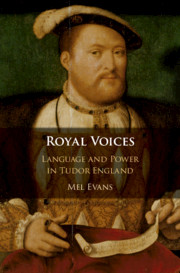Book contents
- Royal Voices
- Royal Voices
- Copyright page
- Dedication
- Contents
- Figures
- Tables
- Acknowledgements
- Introduction
- Part I Authentic Royal Voices
- Part II Appropriated Royal Voices
- 5 Non-Royal Views of Royal Voices
- 6 Impostor, Protector and Queen
- 7 Writing Royal Voices
- 8 Royal Voices, Narrative and Ideology in Sixteenth-Century Chronicles
- Conclusion
- Works Cited
- Index
5 - Non-Royal Views of Royal Voices
Afterlives and Metalanguage
from Part II - Appropriated Royal Voices
Published online by Cambridge University Press: 28 February 2020
- Royal Voices
- Royal Voices
- Copyright page
- Dedication
- Contents
- Figures
- Tables
- Acknowledgements
- Introduction
- Part I Authentic Royal Voices
- Part II Appropriated Royal Voices
- 5 Non-Royal Views of Royal Voices
- 6 Impostor, Protector and Queen
- 7 Writing Royal Voices
- 8 Royal Voices, Narrative and Ideology in Sixteenth-Century Chronicles
- Conclusion
- Works Cited
- Index
Summary
Chapter 5 surveys non-royal discourse for evidence of how royal texts, and their material and linguistic properties, were recognised, understood and used by Tudor subjects. The chapter looks first at the documented afterlives of many royal texts, via manuscript circulation and publication, before examining metacommunicative remarks relating to royal letters and proclamations in manuscript letters and printed texts of the period. Proclamations have a wider range of discussion, likely reflecting their more public profile and dissemination, but both types of texts are used to justify the actions of the writer.
- Type
- Chapter
- Information
- Royal VoicesLanguage and Power in Tudor England, pp. 157 - 166Publisher: Cambridge University PressPrint publication year: 2020

